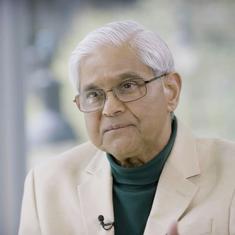Anil Antony resigns from Congress a day after he criticised BBC documentary on Modi
The son of former Union minister AK Antony said he faced online abuse for saying that the BBC has ‘a long history of prejudices’ against India.

Congress leader Anil Antony resigned from the party on Wednesday, a day after he tweeted that placing the views of the BBC documentary on Narendra Modi’s alleged role in the 2002 Gujarat riots above those of Indian institutions undermines the country’s sovereignty.
On Tuesday, Anil Antony, the son of former Union minister AK Antony, had called the BBC a “state-sponsored channel with a long history of prejudices” against India.
The first episode of the BBC’s two-part documentary titled India: The Modi Question was released on January 17. It alleges that a team sent by the British government had found that Modi, who was the chief minister of Gujarat when the riots took place, was “directly responsible for a climate of impunity” that led to the violence against Muslims.
On Wednesday, Anil Antony wrote another tweet, saying that he had received “intolerant [phone] calls” asking him to retract his tweet on the documentary and was subjected to online hate and abuse.
He said that it was a matter of hypocrisy that those “supporting a trek to promote love” – an apparent reference to the Bharat Jodo Yatra – were abusing him for his views on the BBC documentary.
I have resigned from my roles in @incindia @INCKerala.Intolerant calls to retract a tweet,by those fighting for free speech.I refused. @facebook wall of hate/abuses by ones supporting a trek to promote love! Hypocrisy thy name is! Life goes on. Redacted resignation letter below. pic.twitter.com/0i8QpNIoXW
— Anil K Antony (@anilkantony) January 25, 2023
Anil Antony headed the digital media cell of the Kerala unit of the Congress and was also the national co-ordinator of the social media and digital communications cell of the All India Congress Committee.
In his resignation letter, Antony accused the Congress leadership of being “keen to work with a bunch of sycophants and chamchas [the Hindi word for sycophants], who would unquestionably be at your beck and call”.
Controversy over the BBC documentary
The BBC documentary cited a report the inquiry team had sent the United Kingdom government. The documentary said that the report has never been published. The second part of the documentary, which examines Modi government’s track record following his re-election in 2019, was released on Tuesday.
While the documentary has not been made available in India, it has been uploaded on several YouTube channels and shared widely on Twitter.
On January 20, the Indian government had used emergency powers available under the Information Technology Rules, 2021, to issue directions to YouTube and Twitter to block clips of the documentary from being shared. The foreign ministry has described the documentary as “a propaganda piece designed to push a particular discredited narrative”.
However, the BBC has said that the documentary has been made after “rigorous research according to highest editorial standards”. A spokesperson also told reporters that the BBC had asked the Indian government to reply to the matters raised in the documentary, but it declined to respond.









